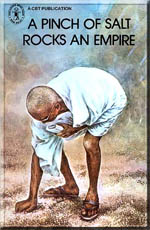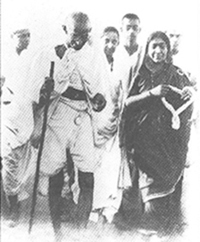
P.O. SEVAGRAM, DIST.WARDHA 442102, MS, INDIA. Phone: 91-7152-284753
FOUNDED BY MAHATMA GANDHI IN 1936
A Pinch of Salt Rocks An Empire
Children's Book : on Dandi March - Salt March

A PINCH OF SALT ROCKS AN EMPIRE
Compiled & Edited by : Sarojini Sinha
Table of Contents
- Map of March Route
- Chapter-1
- Chapter-2
- Chapter-3
- Chapter-4
- Chapter-5
- Chapter-6
- Chapter-7
- Chapter-8
- Chapter-9
- Chapter-10
- Chapter-11
- Chapter-12
- Chapter-13
About This Book
Compiled & Edited by : Sarojini Sinha
Illustration by : : Mrinal Mitra
First Published :1985
I.S.B.N :81-7011-291-5
Published by :Children's Book Trust
Printed at : Indraprastha Press
Nehru House,
4 Bahadur Shah Zafar Marg,
New Delhi,
India
Navajivan Mudranalaya,
Ahemadabad-380014
India.
© CBT, 1985
Download
Chapter - 10

Since Gandhiji was under arrest and could not lead the raid on the Dharasana salt depot, his successor, Abbas Tyabji, set out from Karadi to lead the raid. On the morning of May 12, the
satyagrahis got up early, said their prayers and fell into line, ready to march to Dharasana. The party had hardly started walking when it was confronted by the District Magistrate and the District Superintendent of Police of Surat with four hundred policemen armed with rifles and lathis. Abbas Tyabji and the satyagrahis were arrested, put in buses and taken to Jalalpur.
Now it became Sarojini Naidu's responsibility to lead the raid. She was in Allahabad attending a meeting of the Congress Working Committee when she learnt of Abbas Tyabji's arrest. She immediately hurried to Dharasana, 250 kilometers north of Bombay.
She said, "I go to victory or death. I shall march ahead of the
satyagrahis....... when they try to break through the military guards at the salt depot. I shall cut the barbed wire with pliers and seize the salt with my own hands.....
"I am a woman but I shall actively participate in this campaign for liberty as though I were a man. I realize the tremendous responsibility entrusted to me by the Mahatma and the nation, but in making the most of this heaven-sent opportunity, neither jail nor death shall hold any terror for me.
"At daybreak on May 15, Sarojini Naidu and fifty volunteers, clad in khadi, marched towards the depot, armed with pliers to cut the barbed wire. Half an hour later they were stopped by a police force. The Superintendent of Police told Sarojini Naidu that she could go no further and she replied, "Well, I shall stay here. I am not going back."
The Superintendent of Police said, "We are going to stay here and offer satyagraha as long as you stay."
Both sides sat facing each other. Sarojini Naidu got a chair from a house nearby and sat writing letters and later spinning yarn. The sun blazed overhead and it was very hot, but the volunteers sat on the road seeking no shelter.
After 28 hours of this peaceful confrontation, the police threatened to arrest Sarojini Naidu. She retired to the volunteers' camp to arrange for more groups to march to the depot. The others were then removed by the police.
More volunteers took their place and, when they were taken away, there were more to replace them. The volunteers would squat on their haunches, waiting for an opportunity to dash to the barbed wire round the depot. Every time they tried to reach it, the police would block them. During the four days that this "game" lasted, two hundred and fifty volunteers were taken from the road and lodged in a temporary jail nearby.
On May 20 the volunteers were ordered to adopt any means short of violence to get through the wire fence and seize the salt pans. They were told not to return without doing what they had set out to do. That day more than 150 volunteers were arrested, but later, they were released.
Very early the next morning, by moonlight, prayers were said and Sarojini Naidu exhorted the volunteers to start the attack on the Dharasana Salt Works. She said:
"India's prestige is in your hands. You must not use any violence under any circumstance. You will be beaten, but you must not resist. You must not even raise a hand to ward off blows. Although Gandhiji's body is in prison, his soul goes with you."
The volunteers shouted, "Gandhiji ki Jai!", formed columns and, with their leaders carrying ropes and wire cutters, advanced on the depot.
Heaps of shining salt lay behind the barbed wire, guarded by four hundred policemen who were directed by several British officers.
Manilal Gandhi, the second son of Gandhiji, was in the front rank of the marchers. As they approached the barbed wire they started chanting, "Inquilab Zindabad! Inquilab Zindabad!"
The column reached the depot at 6.30 a.m. When the leaders tried to throw ropes round the posts holding the barbed wire to pull and uproot them, the police rushed on them with steel tipped
lathis.
Not a single marcher raised his arm to defend himself as the police repeatedly beat him. In two or three minutes the ground was covered with fallen volunteers, their skulls or shoulders fractured with the blows. Great patches of blood stained their white clothes. But those behind them continued to press forward till they too were struck down.
When every one in the first column had been struck down, stretcher bearers rushed up and carried the injured to a thatched hut.
Another column then formed up and marched towards the barbed-wire fence. This column also was struck down. There was no fight or struggle. The marchers just walked forward until they fell injured.
The brutal beating of unresisting men angered many in the watching crowd. The leaders had a hard time persuading them to remain peaceful, reminding them of Gandhiji's instructions. The British Superintendent of Police also sensed their anger and posted twenty-five of his men armed with rifles on raised ground to fire if the crowd turned violent.
The volunteers now changed their tactics. In groups of twenty-five they sat near the wire fence, making no attempt to go through it. Yet the police attacked them. Bleeding bodies toppled over, but fresh groups of men took their place and allowed themselves to be beaten.
The police then started dragging the men away, seizing their arms or legs. Some were thrown into a nearby ditch filled with water.
Hour after hour, the stretcher bearers carried away bleeding bodies and put them in rows in the temporary hospital. The few doctors there were unable to cope with the number of injured.
At last a British Officer went up to Sarojini Naidu and touching her arm, said, "You are under arrest."
She said, "I will come with you, but don't touch me."
The crowd cheered as she followed the officer to the barbed-wire enclosure that served as jail. Later, Manilal Gandhi was also arrested.
The volunteers then decided to suspend the operation for two days, till reinforcements of
satyagrahis arrived. But the police and the military blocked the main road to Dharasana and managed to prevent volunteers from getting through.
Though denied reinforcements, the satyagrahis continued the attempt to enter the salt works till June 6.
Writing about the action at Dharasana, Young India reported, "And this is the Government of India, red in all its tooth and claw. It can strike its lathis on harmless, unarmed citizens.... The satyagrahis did not succeed in bringing salt from the salt heaps. They were beaten, wounded, abused. They sustained a partial defeat in as much as some of them gave way before the furious lathi charges.
"But those who suffered the blows did so quite joyfully.... They unmasked to the whole world that the Government is not founded on love and consent of the people, but it rules the people against their will, keeping them down by sheer physical force.
"They can only rule India as long as the people are not strong and determined enough to undergo all possible suffering unflinchingly in order to overthrow this Government.... Who will say that the satyagrahis are defeated?.... We hope that their sufferings will bring about a change of heart in the oppressors."
The ultimate aim was not so much to seize salt as to bring to light the violence on which British rule rested and to put moral pressure on the government.
Gandhiji also wanted Indians to regain their self-respect by showing them that they could challenge the all powerful British Government.
As he had hoped, the Government's repressive measures, far from cowing the people, only made them intensify the satyagraha. All over the country, people either made salt or raided government salt works. Nearly fifteen thousand marched on the salt depot at Wadala near Bombay. Many were beaten with lathis and badly injured.
The boycott of foreign cloth was having its effect on the textile industry in England. Hardly any cloth could be sold in India. So many mills in Lancashire were idle.
The no-tax campaign also spread, particularly in Gujarat. In the taluks of Bardoli, Borsad and Kambusar the peasants had to suffer great repression for refusing to pay land revenue. The property they owned was sold at ridiculously low price. At one place, property worth Rs. 3,000 was sold for just Rs. 15. When they could no longer bear the repression, about eighty thousand people migrated from Gujarat to the State of Baroda.
A report said, "One passed row after row of padlocked cottages, and through the bars of windows one could see only empty rooms. The streets were silent lakes of sunlight."
Unrest had spread. About one lakh satyagrahis, seventeen thousand of them women, were in jail. The Indian National Congress now called upon students to boycott schools and colleges and take part in the national struggle for freedom. Pandit Jawaharlal Nehru called upon the people to boycott the coming census operations.
The administration was nearly paralyzed. The Viceroy, who had laughed at Gandhiji's "crazy scheme of upsetting the government with a pinch of salt", found that he was no longer in control. The pinch of salt had proved more powerful than a trainload of dynamite!